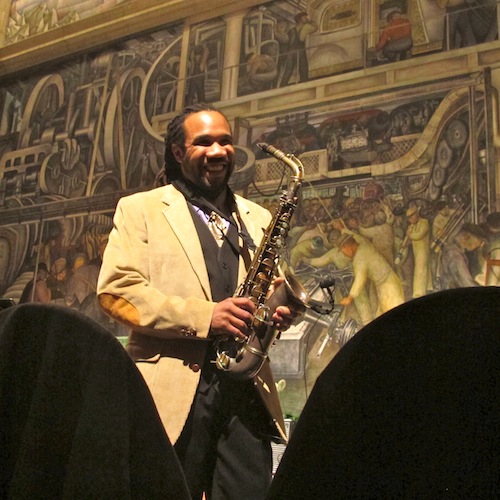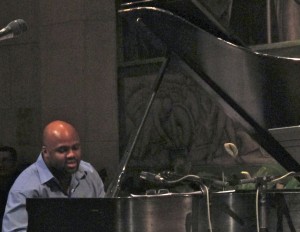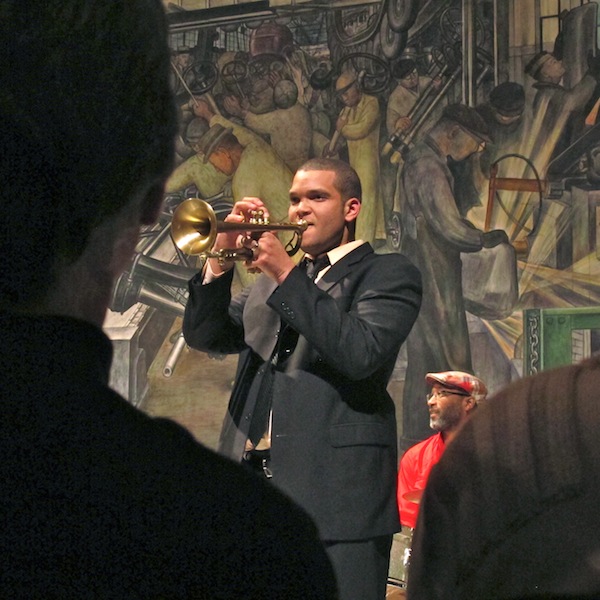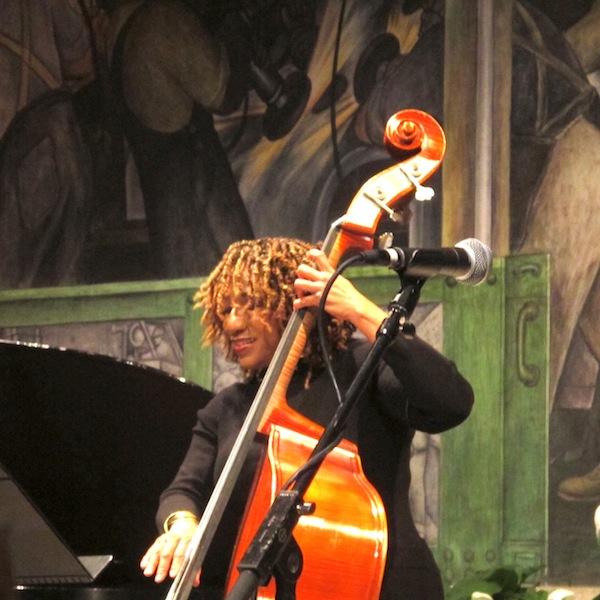
Mike Monford & Detroit Effervescence perform at Detroit Institute of Arts
Local jazz ensemble Mike Monford & Detroit Effervescence performed last Friday in the Diego Rivera mural room at the Detroit Institute of Arts — a Knight Arts grantee — as part of the museum’s “Friday Night Live!” series, which offers free admission to Detroit residents, extended late hours, free drawing workshops and a truly impressive calendar of musicians. The performance featured soulful, highflying improvisations by Monford on saxophone, Dwight Adams on trumpet and Ian Fenkelstein on keyboard, all backed by the exquisitely in-sync percussion and bass combo of Djallo Djakate and Marion Hayden.
The concert was the kick-off event for Black History Month celebrations at the Detroit Institute of Arts, giving the night an additional gravity that was only compounded by the magnificent backdrop of the Rivera mural. When the group played “Lift Every Voice and Sing,” otherwise known as the Black National Anthem — a song first publicly performed in 1900 — I was viscerally reminded of the many struggles undertaken to get our society to its current point. I began to think also of the struggles to come, of how much further there is to go.
It is too easy to think of past struggles as finished, or even to think of struggle in general as something for antiquity. There is some strain in contemporary culture that believes — or would very much like to believe — we’ve reached a point where all is well, that all the variables have been properly accounted for, that everything is more or less in its proper place. This way of thinking undoubtedly runs through all time periods, not just our own, but I am not alone in worrying that an advanced apathy is settling in and, along with it, a widening gap between belief and positive action. It is a depressing thought.
After the performance, however, as I wandered the halls of Detroit Institute of Arts, something else occurred to me: I wasn’t depressed at all; I was thrilled. I’d been able to visit the museum at no charge, which is a thrill that goes far beyond skipping out on the very reasonable admission price. It came from my realization that there still exist institutions, donors and citizens who care, who are so devoted to keeping alive great music and artwork — some of our culture’s highest achievements — that they’re willing to cover everyone’s admission costs in order to encourage as many people as possible to experience them.
This is a beautiful thing. Beyond that, though, it is also one part of the struggle for positive social change, because even if the struggle is fought in the streets, it begins and ends in the mind. To be clear, no work of art alone “does” anything. A painted canvas hung on a wall does not create social change. However, a work of art can challenge its viewer, encourage a richer imagination and engender an appreciation for subtlety that makes the mind less susceptible to the easy solutions provided by prejudice — racial prejudice, of course, but also political prejudice, or even a prejudice that the world as it exists today is as good as it gets, that the fight is over, that no greater reality is possible, which is ultimately a prejudice against hope and enthusiasm, a prejudice against the future.
All photos by Sarah Sharp. Detroit Institute of Arts: 5200 Woodward Ave., 313-833-7900, dia.org
Recent Content
-
Artsarticle ·
-
Artsarticle ·
-
Artsarticle ·




